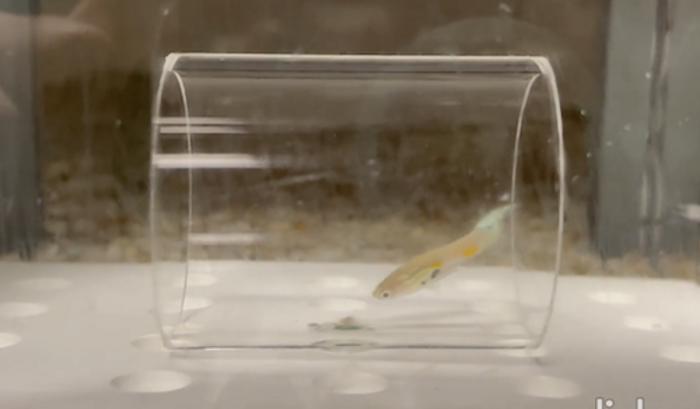The telencephalon is the part of the brain responsible for executive functions in fish, according to an experimental study. Zegni Triki and colleagues used guppies (Poecilia reticulata) that had been selected over five generations to have smaller or larger telencephalons, resulting in a 10% size difference between “up selected” and “down selected” lines of fish. Total brain size was not significantly affected. The authors then presented 48 male fifth-generation fish from both lines with tests of cognitive flexibility, inhibitory control, and working memory—the three commonly accepted components of the psychological skills known as “executive functions.” To test for cognitive flexibility, the fish were trained to associate one of two colors with food. The food reward was then swapped to the previously unrewarding color. Sixty-three percent of up-selected fish and just 48% of down-selected fish were able to learn the new association within 84 trials. To test self control guppies were presented with a situation in which a detour around a clear barrier was required to access food. Fish that can delay gratification long enough to detour around the obstacle are said to show some measure of self control. Both lines preformed similarly, but up-selected fish got better at the task over time. Finally, the fish were challenged with a test of working memory when food was hidden behind an opaque barrier. Up-selected fish showed 60% success over 16 trials, whereas down-selected fish showed just 49% success over 16 trials.

Credit: Triki et al.
The telencephalon is the part of the brain responsible for executive functions in fish, according to an experimental study. Zegni Triki and colleagues used guppies (Poecilia reticulata) that had been selected over five generations to have smaller or larger telencephalons, resulting in a 10% size difference between “up selected” and “down selected” lines of fish. Total brain size was not significantly affected. The authors then presented 48 male fifth-generation fish from both lines with tests of cognitive flexibility, inhibitory control, and working memory—the three commonly accepted components of the psychological skills known as “executive functions.” To test for cognitive flexibility, the fish were trained to associate one of two colors with food. The food reward was then swapped to the previously unrewarding color. Sixty-three percent of up-selected fish and just 48% of down-selected fish were able to learn the new association within 84 trials. To test self control guppies were presented with a situation in which a detour around a clear barrier was required to access food. Fish that can delay gratification long enough to detour around the obstacle are said to show some measure of self control. Both lines preformed similarly, but up-selected fish got better at the task over time. Finally, the fish were challenged with a test of working memory when food was hidden behind an opaque barrier. Up-selected fish showed 60% success over 16 trials, whereas down-selected fish showed just 49% success over 16 trials.
Journal
PNAS Nexus
DOI
10.1093/pnasnexus/pgad129
Article Title
Experimental expansion of relative telencephalon size improves main executive function abilities in the guppy
Article Publication Date
20-Jun-2023




